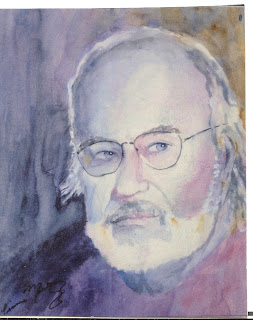THE CASE OF THE PURLOINED PAMPAS GRASS
The Rev. Dana Prom Smith, S.T.D., Ph.D. (7/11/2011)
A clump of pampas grass has been purloined from the Gardens at the Olivia White Hospice. So far, the usual suspects have denied any participation in or knowledge of the theft.
One thing is known. The theft was accomplished by people knowledgeable in the ways of gardening. The pampas grass was removed with surgical skill. The hole left by the death of the pampas grass was expertly filled, and a buried drip line was carefully replaced. Thus, the search is focused on horticulturally trained thieves. They had to be botanical connoisseurs to have accomplished the theft in the dark of night. In short, they were not thug’s intent on replacing the pampas grass with asphalt and concrete.
One thing is certain. The purloined pampas grass was not an inside job since the volunteer gardeners at the Olivia White Hospice Gardens have expressed dismay and disappointment at the removal of the pampas grass. One person, a former senior executive with the garden who had previously expressed displeasure with the pampas grass, has been questioned but has firmly denied any connection with the theft. Being a person of rectitude and probity, her denials have been accepted.
The issue of the pampas grass gets to a concern at the heart of gardening in Flagstaff and the high country: invasive, exotic species. Was it, to quote Asa Gray, the famous American botanist of the 19th century and friend of Charles Darwin, one of those “intrusive, pretentious and self-asserting foreigners?” Was the pampas grass a magnificent weed?
Indeed, it fits the definition of weed. It’s invasive. It sucks up scare water. It overtakes defenseless native plants and grasses. Richard Mabey, the English botanist calls weeds: “Shape-shifters” with speed, ingenuity, and “almost supernatural resourcefulness.”
However, this particular pampas grass did not appear to be guilty of any of these crimes. It just sat in its corner of the garden, much like a castrated male lion lounging in the shade of a tree on the veldt sporting his splendid plumage. It has been alleged by several horticultural experts in the community that this particular pampas grass was sterile and could not rape the land. Perhaps, these eco-terrorists mistook impotence for power.
In their eco-terrorism, they may have been ignorant of the impotence or, perhaps, they were just opposed in principle to all non-native shrubbery all of which makes them botanical extremists and ideologues. Whatever their motivation, if everyone dup up plants they did not like no matter their location, chaos would ensue. No gardens or gardeners would be safe.
The case of the purloined pampas grass raises the issue of non-native plants and grasses. Are all gardeners under threat by these horticultural purists? Does their list of targets include Kentucky blue grass front lawns, the lawn in front of the City Hall, or the golf courses in sequestered communities for the rich? Are bearded irises, adaptable to Flagstaff but not native, subject to attacks by eco-terrorists?
So far the investigation has acquired a list of denials and know-nothings. One person who spoke on condition of anonymity because the person was not authorized to speak said that there must be a vast horticultural conspiracy of silence, a cover up if you will, leading to the conclusion that the culprits will never be apprehended, brought to trial, and punished.
The terrorists apparently have taken to heart Barry Goldwater’s famous nostrum: “Extremism is the defense of liberty is no vice, and moderation in the pursuit of justice is no virtue.” All of this raises the question: Is botanical theft a moderate vice or an extreme virtue?
Martin Luther King, Jr., had one rule for civil disobedience. If someone chose to disobey an unjust law, he or she had to have the courage to accept responsibility and face punishment. Indeed, one of his great pieces was a “Letter Written from Birmingham Jail.”
So far no one has come forward to claim responsibility. For now, we are left with a missing clump of pampas grass, an unclear definition of invasive exotics, and the threat of botanical extremists digging up plants wherever their fancy suits.
Copyright © Dana Prom Smith 2011



